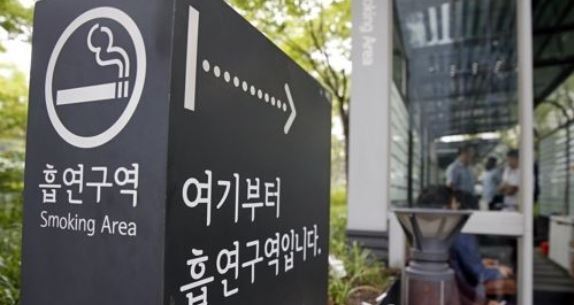Seoul appears to be taking a step closer to completely banning smoking in public with its move to outlaw lighting up on the streets, but its recent decision to delay the scheme is only deepening the dispute between smokers and non-smokers.
According to the Seoul Metropolitan Government, the anti-smoking policy raised by the Seoul Metropolitan Council to ban all smoking on the streets recently went back to square one due to practical issues.
“Despite the public giving a nod to banning public smoking, we came to review the plan as it is difficult to define what public smoking is in practice.
The (definition of the) place for public smoking is too broad and blurred, so instead we may designate more non-smoking areas,” said a Seoul City official in charge of the citizen’s health bureau.
The city government’s anti-tobacco move was initially praised by non-smoking groups. According to a poll conducted by the city in August, almost 9 in 10 citizens agreed with the policy to completely ban smoking in public. Only 7 percent said no.
At the moment, there are 17,500 public areas where smoking is prohibited, which include some 3,400 areas close to education facilities such as kindergartens and day care centers. About 6,800 bus stops, 1,700 subway exits, 1,700 parks and squares are also designated as nonsmoking areas.
In addition, 57 streets in areas with heavy foot traffic, including Insa-dong and part of Gangnamdaero, are now no-smoking zones, and violators face fines of up to 100,000 won ($92).
There are also another 23,900 indoor locations -- buildings of public offices, restaurants, hospitals and some apartments -- designated as smoke-free zones. The city plans to add more non-smoking areas next year.
“We will designate at least one street in each of the 25 districts in Seoul as an area forbidden for smoking, and add another 3,300 places near kindergartens as non-smoking areas,” said the Seoul Metropolitan Government.
While no-smoking areas multiply, the city has been slow to introduce “safe” places to smoke. At present, there are only 43 outdoor smoking booths installed in public places across the capital.
“It is outrageous how the city is only increasing non-smoking areas. It is more reasonable to build more smoking areas for smokers who do not have a place to smoke. It will become harder for smokers to find a place to smoke when the city designates all streets as non-smoking areas,” said Lee Yeon-ik, head of smokers’ group I Love Smoking in an interview with a local radio station.
“All I see on the street is non-smoking areas. Even at home, there is no place for a smoker to freely light a cigarette. It’s not like we are carrying out an illegal act, right? Smokers have the right to smoke so what we’re asking is simple -- give us more official places to smoke,” said Kim Jin-gwang, who was a heavy smoker for two decades. Kim went cold turkey after his daughter was born a year ago.
In contrast, anti-smoking groups argue that they have the right to refuse exposure to cigarette smoke.
“I often get shocked when walking on the street with my son. I see people walking and smoking, and it’s people like us who are walking behind who get directly exposed to second-hand smoke,” said Ji Eun-hee, 30.
According to Seoul City’s survey in 2015 on 2,853 citizens, 91 percent said they had negative experiences with regard to secondhand smoking in public. About 63 percent of them said they were exposed to passive smoking on streets, while another 17 percent said they had experienced it at the entrances of buildings.
Cigarette smoke can travel as far as 20 meters in radius.
“If you light a cigarette on the first floor of your apartment, the smoke will travel all the way up to the fifth floor. The smoke does not only influence those who live below or above,” said Lee Soo-hyun, director-general of Smoke Zero Network, an association of non-smokers here, adding that a complete ban on smoking would ease the threat of secondhand smoke.
The Ministry of Health and Welfare, however, ruled out the possibility of designating a city’s streets as forbidden for smoking.
“Some of the outdoor public spaces in Seoul are under personal property. It would be more realistic (for the city government) to designate populated streets or public areas as non-smoking zones,” said a ministry official.
In September, the World Health Organization recommended South Korea adopt more stringent regulations to ban cigarette smoking in public places and restrict tobacco advertising and promotions.
South Korea was not properly implementing policies on protecting, enforcing bans and raising taxes, according to the WHO Report on the Global Tobacco Epidemic 2017.
“Subnational jurisdictions have the authority to adopt laws that ban tobacco smoking in any or all of the places mentioned above. However, no subnational laws have been reported,” the report said.
By Kim Da-sol (
ddd@heraldcorp.com)







![[Weekender] Korea's traditional sauce culture gains global recognition](http://res.heraldm.com/phpwas/restmb_idxmake.php?idx=644&simg=/content/image/2024/11/21/20241121050153_0.jpg)
